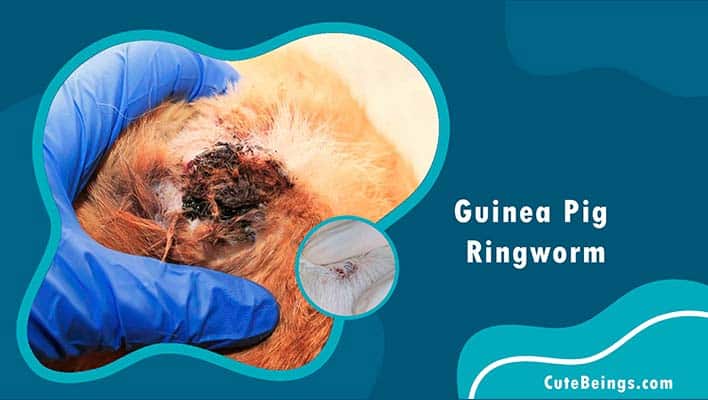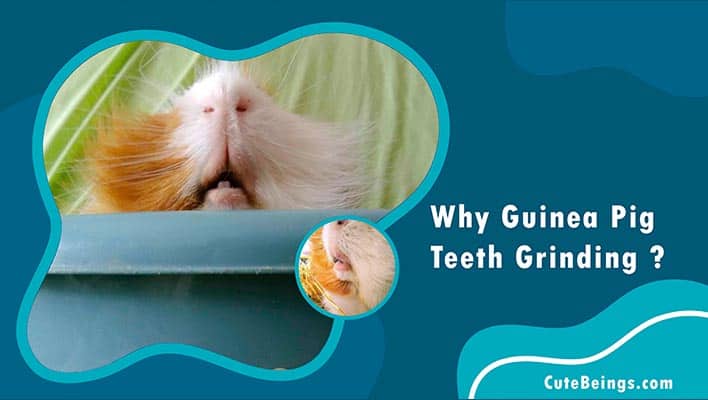As a guinea pig owner you will have to be careful of various diseases of your guinea pig such as infections and skin parasites. Guinea pig ringworm or dermatophytosis is a widespread health condition you will have to look for among your guinea pigs. Such situations can be really harmful and painful for your small pet and basically all domestic pets can get ringworm infection.
Table of Contents
Reasons
Mostly this skin infection is caused by Trichophyton mentagrophytes and it is not really caused by a parasitic worm. Different species of fungi can cause ringworm and Microsporum canis which is a different organism is the most common reason in cats and dogs.
These fungi species can cause tinea, ringworm of the body or tinea corporis and athlete’s foot. Human beings commonly catch a form of it which is called “athlete’s foot” or tinea pedis.
Signs
This fungal skin infection can be easily noticed on guinea pigs as a round, ring like patches. These patches could first appear on head, on the face near the eyes, nose, arms, and ears. These patches may show a crispy flaky look or sometimes as red patches. If not treated in early stages this skin condition can spread along the back. It can appear anywhere in the body but can be found mostly in those areas.
Itching or irritation can occur as a result of this infection and in mild cases it won’t be itchy for your pet guinea pig. As the situation gets worse it can spread on the whole body and will cause itchiness.
Hair loss can occur at the edges of lesion and crusting and scaling are also common conditions.
Treatments
With proper medication ringworm can be treated productively. If you suspect that your pig is suffering from ringworm seek advice from your veterinarian and take your infected guinea pig to conduct a proper diagnosis to make sure. Follow the specific advices of your vet and gradually your guinea pig will reach its normal health status.
A visual examination would be enough for your vet to come to a conclusion of your pet’s condition. Sometimes skin scrapings might be collected to conduct a laboratory investigation and with the use of an ultraviolet light vet may check the extent of the skin lesions.
After examining the condition of the infection your vet may prescribe antifungal medication, washes, ointments and oral medications. In some situations ringworm could heal on its own and if that doesn’t happen you will have to take your pet through an antifungal medication course.
If your pig has one or two patches and the infection looks mild your vet would prescribe just a topical antifungal ointment. Such treatment could last up to 7-10 days and it is vital that you complete the entire treatment. In severe cases you will have to continue oral antifungal medications about 4 to 6 weeks.
Further your vet might suggest correcting the dietary deficiencies of your pig and he or she would recommend the use of vitamins and mineral supplements to improve the health of your pet.
A fungal infection is distasteful situation for the affected guinea pig but can be considered as harmless. It can be cured quickly and easily with proper treatment.
Actions To Prevent Guinea Pig Ringworm
-
Check your new pigs
When you purchase or get new pets you should carefully examine them for such diseases as new infected animal could be the prime source of infectious diseases. They usually carry the fungal spores and when immune system is weakened ringworm spores would do its worse to your pet.
So before you bring them home examine them carefully and make sure they are healthy and that will make things easier things afterwards.
-
Always clean your hands after handling your pig specially before touching healthy guinea pigs or anything else in the cage.
-
Clean the guinea pig cage
Ringworm infection can be avoided if you clean the cage regularly. By washing down the interior of the cage, washable toys and dishes regularly and regular sanitation will avoid the buildup of contaminated material inside the cage and eventually reduce the chances of ringworm infections in your guinea pigs. Replacing the bedding material and chips would help too and use biodegradable soap and water when cleaning.
If the cage is clean, fungus could not build up and it will keep ringworm infection away from your guinea pigs. Perform an extensive cleaning of the cage at least once a week.
-
Provide a dry environment to your pets
In addition to cleaning the guinea pig’s cage provide a dry environment to your pet daily. Ringworms could buildup faster in moisture so replace any wet bedding and wet patches of chips daily to maintain a dry environment.
-
If you have two or more pigs keep the infected pig separate until the infection is healed.
Suppose you have two pigs and only one would get ringworm and the other will remain unaffected. This is a similar situation with fleas, mite and lice as well.
If you face such situation separate the affected one from the healthy one as ringworm is highly infectious. If you suspect or notice all your pigs are affected you can keep together and treat them at the same time.
After the treatments make a visit to your vet to make sure that you guinea pig is ringworm free. Then you can keep the cured pig with others.
Before you place the cured one back in the cage give a good clean and sanitize the cage and maintain a higher level of hygiene for your pets.
-
Do exactly as your vet instructed and continue the medication as it finishes. Do not stop the medication early for any reason otherwise everything you have done so far would go in vein.
-
After the treatments are completed, visit your vet and get the ok from your professional to make sure the infection is totally gone.
-
Always give the correct dosages of prescribed medicines in prescribed times.
Use a syringe to give oral medication. Gently hold pig’s head then insert the tip of the syringe behind the front teeth and squeeze the medication.
With pills, crush them add it your pig’s meal and make sure your pig eat the whole meal which contains pills.
-
Treat the patches on skin
Patches can cause a great deal of irritation to your guinea pig. Your veterinarian will prescribe an ointment for the patches so you can rub it on the skin. Follow the advice about the quantity of the ointment use and read the instructions paper for proper application.
Do not use an antifungal medication especially a cream without your vet’s advice.
-
Offer more Vitamin C to your guinea pig
Vitamin C can strengthen guinea pig’s immune system further help in fighting with ringworm. You can add vitamin C to your guinea pig’s water. Also you can offer vitamin C rich vegetables such as mustard greens, kale and spinach and vitamin C rich guinea pig pellets to your guinea pig. With pellets the effectiveness can be lost after the pellet bag is opened.
Can Guinea Pig Ringworm Transmitted To The Humans?
Yes, ringworm can be passed onto humans. There are few circumstances that guinea pigs can pass sickness to humans and ringworm can be passed onto children especially who are under 5 years old. So you need to be very careful when handling an affected guinea pig.
If the children are in close contact with the pets, there is a risk that they can be infected with a group of fungi which can cause skin sickness.
Skin problems such as ringworm can quickly spread between animals and between humans and animal. In households, elimination can be difficult due to the higher contamination. But with guinea pigs the risk is less than the dog or cat. The size of guinea pig matters in such situation and even if there is any contamination it would be kept within the cage most of the time.
The state Zoonotic means the lesions can spread to humans from guinea pigs. If you become aware of such lesions on your skin do not hesitate to contact your doctor or the pharmacist for a treatment.
If you are infected, treating immediately is essential to keep your family protected.

After the treatments you should pay a visit to your vet to make sure that the infection is fully cured and to review the skin condition of your pet.
To stop spreading the disease, never hold your guinea pig close to your face and avoid kissing your pet.

Hello, my name is James and I’ve been caring for tiny pets for over 14 years with a passion. I enjoy passing on my expertise to other individuals in order for them to have the same amount of enjoyment as I do.




